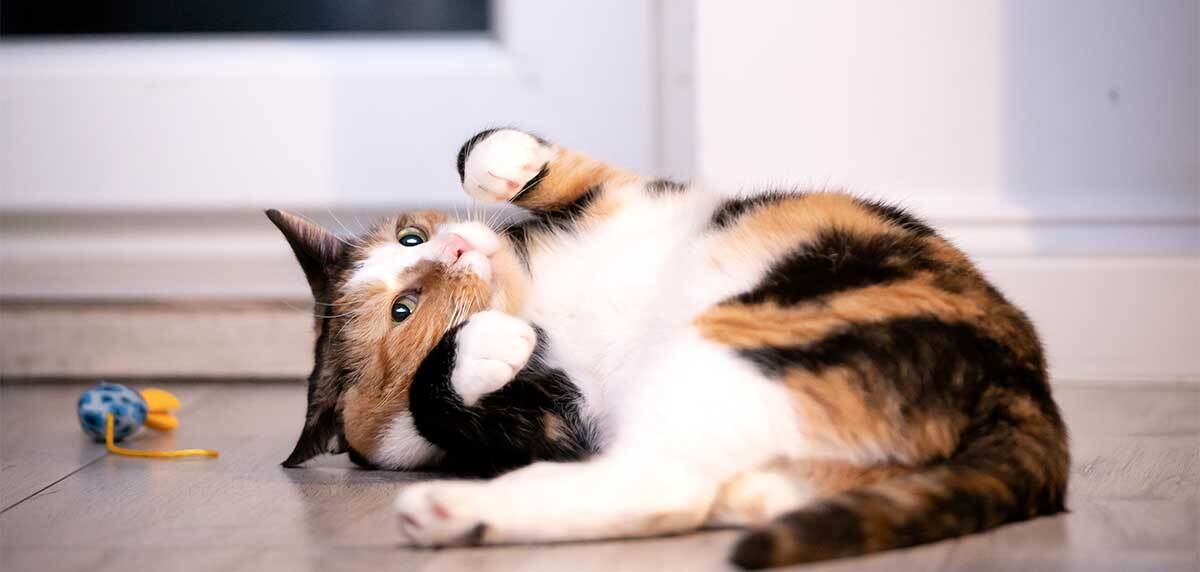Understanding a meowing cat
03.01.2024 - Reading time: 7 minutes

A cat does not always meow in the same way and each cat has its own meowing habits for communication. Find out what your cat's meowing means here.
According to anthropozoologist John Bradshaw, cats developed the meow as a means of communication in their relationship with humans. Some breeds of cat are particularly chatty. Feral cats, on the other hand, hardly ever meow. A meowing cat wants to get a message across and it’s up to the owner to figure out what it is. Recognising your cat’s different meows makes life together easier.
What is a meowing cat trying to say?
A cat doesn’t always meow in the same way and each cat has its own meowing patterns in order to say to their owner “Open the door for me”, “I’m hungry” or “I’m bored, play with me”. They learned that meowing could be useful from an early age. A kitten that is cold or in a dangerous situation will call its mother by meowing loudly. She’s usually not far away and comes running straight away. If your cat follows you into the house meowing, they may simply be hungry or thirsty. Make sure that their bowl still contains biscuits and they have enough water available. Your little feline usually knows how to make themself understood. If they want to go out to get some air, for example, they will probably meow at the door, giving you a look that says it all. If you’re busy doing something else, you may not have really noticed or reacted quickly enough. The meowing will then become louder and will only stop when your four-legged friend has got what they wanted. Cats are very persistent. A cat that meows a lot for no apparent reason my have health problems. Check for other symptoms and, if in doubt, ask your vet for advice.
Cat that meows all the time – the reasons
The mating season for cats runs from February to early autumn, although some breeds, such as the Siamese, are sexually active all year round. During this period, the females come into heat several times. Their behaviour therefore changes, they are more cuddly, less shy of strangers and some mark their territory by urinating. However, their main tool for attracting tomcats is meowing. This requires a good deal of patience from the owner, who has to put up with these long, monotonous sounds for days and often nights on end. As if that wasn’t enough, the various suitors attracted by the little feline will gather on your doorstep, threaten each other with loud meows and probably fight. If you don’t want your cat to reproduce, the best way to avoid it is to have your little furball neutered. The average age of sexual maturity in female cats is around seven months. Your vet will advise you on the right age to have your cat neutered, depending on her breed and a number of other factors.

A cat that meows a lot
The life expectancy of domestic cats is between 13 and 18 years. As in humans, old age is often accompanied by a variety of problems. Your elderly cat may behave differently and stop doing their business in the right places or meowing excessively. This is often due to factors such as:
- hyperthyroidism
- hypertension
- damage to the brain, such as a stroke
- cognitive dysfunction
If your elderly cat has started to meow more than they used to and shows certain signs of senility – they don’t always recognise you, seem disoriented, no longer clean themself – ask your vet for advice. He or she will probably prescribe a treatment to improve your cat’s quality of life. Be there for your old friend, even if they don’t react to your interactions like they used to. Organise their living environment to suit their advanced age and the situation. The better they feel, the less they should meow.
Meowing cat at night – What should I do?
You have just welcomed an adorable kitten into your family and everyone already adores them. At least until it’s time to go to bed. You’ve settled your little protégé into their cosy new basket, given them a little pat and wished them a good night. The first day was probably a bit tiring for you too, so you head for your room. Your new little four-legged friend is suddenly no longer tired, gets out of their basket and follows you, meowing. A kitten that meows at night is not out of the ordinary and is in fact perfectly natural. Separated from their mother and siblings, the little animal suddenly finds themself in a totally unfamiliar environment. As we’ve already mentioned, a kitten in distress has a habit of meowing loudly to call its mother. So that’s what yours will be doing for most of the night. If you don’t want your adult cat to sleep in your room and on your bed, you’re going to have to be firm and put up with the meowing for a few nights. Because even if the first thing that comes to mind when a cat meows at night is to move it into the bedroom, this will have consequences that you may regret. It’s your decision whether you think a kitten that meows for two or three nights is better than a big cat that lies on your pillow every night for years.
How do you calm a cat that meows in the car?
The holidays are coming up and there’s no way you’re going to leave your cat at home on its own, even if your neighbours are willing to come and give it something to eat and drink. Perhaps the last car journey with your little feline didn’t go so well, and you’d like to know how to ease your cat’s stress – and yours – this time round. Many cats suffer from travel sickness: they pant, meow, vomit and are sometimes very agitated.
The following tips will help you travel more peacefully with your pet:
- If you haven’t already done so, buy a comfortable, roomy carrier several weeks before you leave. Your cat will be able to sniff and inspect it straight away. It won’t be an additional stress factor.
- Put a soft blanket and one or two of your cat’s favourite toys in the carrier.
- Don’t feed your cat before you leave, but offer them a drink during the journey.
- Reassure your little companion with a soft voice and perhaps some relaxing cat music.
- Give them natural calming agents such as catnip, chamomile or valerian.
- Anti-sickness medication may help your cat’s stress.
How do you silence a cat that meows all the time?
There’s no such thing as a cat that meows loudly for no reason, even if some, like Siamese cats, are chattier than others. Before asking how to stop it, it would be better to learn why they are meowing. A cat that meows from time to time is completely normal. If they meow virtually non-stop even if they have their usual food, drink and favourite place to relax in front of the window, the meowing may be a sign of health problems. Keep an eye on your little feline Do they have other symptoms such as:
- A change in appetite
- Diarrhoea
- Vomiting
- Breathing difficulties
- Blood in their urine
- An unusual walk
If you have a cat that meows loudly all day long, don’t hesitate to make an appointment with your vet. They will be able to diagnose any illness.
Did the veterinary examinations fail to reveal anything and your cat is still meowing incessantly? It may be linked to stress. Has anything changed in your life recently? A new family member or pet? Moving house is also a stressful situation for many cats. Your feline will probably be a little disoriented in the beginning and will meow to express their uneasiness. Boredom may also be a reason why your little furball is meowing. A cat that was used to exercising outside and suddenly finds itself in a flat will find it hard to adapt. In this case and if it really isn’t possible to let the cat go out, the owners should offer them enough ways to occupy itself indoors: cat trees, games high observation posts and at least one next to the window. Play with them regularly, speak to them, cuddle them. The sound of a cat meowing is disturbing for you and your neighbours. Finding a solution to the problem quickly will spare everyone’s feelings, including the cat’s.


